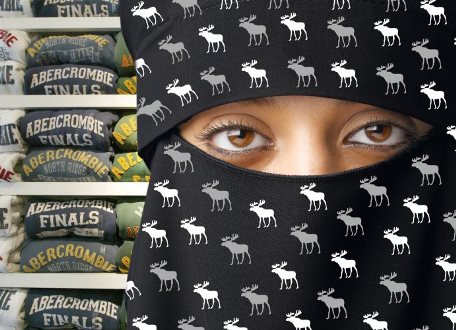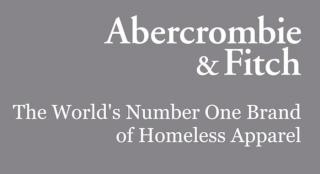
Community

Muslims & Jews Unite vs. A&F
ANT KATZ
Dean Obeidallah, writing on THEDAILYBEAST.com (the online version of Newsweek magazine) yesterday, said: Say what you want about Abercrombie & Fitch (A&F), the chain has done something special. No, I’m not talking some dazzling new clothing line for ultra-hip young people. Something far better.
A&F has brought American Muslims and Jews together. Of course, the bad news for A&F is that they have united some in these two communities against them.
 RIGHT: Muslim Samantha Elauf was qualified to work at A & F – except that she wore a hijab. And now, Jewish groups have joined her fight. PIC:Elena Scotti/The Daily Beast
RIGHT: Muslim Samantha Elauf was qualified to work at A & F – except that she wore a hijab. And now, Jewish groups have joined her fight. PIC:Elena Scotti/The Daily Beast
Last week seven Orthodox Jewish groups joined with the Muslim civil rights group CAIR in filing briefs with the Supreme Court in support of a lawsuit filed on behalf of Samantha Elauf against A&F. Elauf, who is Muslim, had applied for a job at an A&F store in Tulsa, Oklahoma when she was 17. The assistant manager at the A&F store had found Elauf qualified for the position and was apparently going to hire her.
However, an A&F district manager then overruled the assistant manager because he didn’t think Elauf fit A&F’s “look policy”. What part of the “look” was the issue? The part that Elauf wore a hijab. Besides the hijab, A&F doesn’t deny that Elauf was qualified.
So, in steps the Equal Employment Opportunity Commission (EEOC), which filed a claim against A&F for discrimination based on religion. For those unfamiliar with A&F’s hiring practices, the clothing chain has become a laboratory for discrimination claims thanks to its “look policy”. In fact, in 2005, A&F settled a class-action lawsuit paying $40 million to several thousand minority woman who had claimed A&F had discriminated against blacks, Hispanics, and Asians applying for positions in its stores.
Both face discrimination
So why are these seven Jewish groups getting involved in a case brought for a Muslim woman? Well, as Nathan Lewin, the lawyer for these Jewish organisations, explained to the Los Angeles Times, men and women in the Orthodox Jewish communities have also faced discrimination when applying for certain jobs because the men wear yarmulkes and want to take the Sabbath off from work as part of their faith. Lewin noted: “It is important that these Orthodox Jewish groups express support for this Muslim woman who has had a similar experience.”
And the brief filed by CAIR expressed a similar sentiment. “This is not an issue limited to one particular religion; many followers of several other faiths, such as Judaism and Sikhism, follow their respective religiously-motivated dress and grooming practices,” it said.
 In the United States, Jews and Muslims have a great deal in common. The most obvious being that both Judaism and Islam are minority faiths in America. Both are about two per cent of the overall population. And sadly, members of both communities have been targets of bigotry and endured discrimination and worse simply because of their faith.
In the United States, Jews and Muslims have a great deal in common. The most obvious being that both Judaism and Islam are minority faiths in America. Both are about two per cent of the overall population. And sadly, members of both communities have been targets of bigotry and endured discrimination and worse simply because of their faith.
While anti-Semitism in the United States is thankfully at all-time lows, it was not always like this. There were times in the nation’s recent history where anti-Semitism was part of mainstream America, such as when people like Father Charles Coughlin in the 1930s and 40s spewed anti-Jewish diatribes to a radio audience of over 30 million people. And even today there are despicable instances of hate crimes versus Jews in our country.
Muslimaphobia is on the uptick
Regarding Muslims, the US has clearly seen an uptick in anti-Muslim bigotry in recent times. It has been seen on TV shows from Bill Maher to Fox News. And even politicians have openly been ginning up anti-Muslim hate for political gain. In fact, in Oklahoma, where the A&F store at issue is located, State Representative John Bennett (R) publicly declared a few months ago that American Muslims are a “cancer that must be cut out of the American society”. And the list goes on.
While there has been increased interfaith work between Muslim and Jewish communities in recent years, there’s still one issue that prevents even greater unity. That issue is the Palestinian-Israeli conflict.
Not every Muslim and every Jew in America is fixated on this one issue. There are Jews and Muslims who find common ground on this issue. But still the Middle East conflict does cause tension between many in these two communities. It was clear to see during the conflict in Gaza in July and August this year, says Obeidallah, “when friendships ended as the conflict and the rhetoric heated up.
“The reality is that the Palestinian-Israeli conflict is likely going to be with us for the foreseeable future. But disagreeing over one issue should not stand in the way of finding common ground on other subjects that are of mutual concern to our respective communities,” he wrote.
Compartmentalise views on the Mideast
Perhaps one approach is to compartmentalise views on the Middle East so that it doesn’t prevent the two communities from building alliances on other issues. For example, we might not agree on whether Jerusalem should be divided, but we all agree that people in our respective communities shouldn’t be discriminated against when applying for a job because a man wears a yarmulke or a woman wears a hijab.
In South Africa, for example, the Beth Din and Muslim Halaal authorities have worked closely together over the years.
The US Supreme Court will hear Elauf’s case in early 2015. Regardless of the court’s decision, the Muslims and Jewish groups who have come together in this matter are setting a great example to not define our communities’ relationship with each other by our differences on one issue, but rather by the numerous issues we agree upon.





Gary Selikow
December 17, 2014 at 8:21 am
‘Why must we unite with and protect those who want our homeland blown off the map?
\n
\n
\n
Hang on there, Gary, not all Muslims want that – online.editor@sajr.co.za
\n
\n
\n
‘
Choni
December 17, 2014 at 12:58 pm
‘Not all, but probably 90% of them; and if not blown off the map , certainly not under Israeli sovereignty.’
david
December 28, 2014 at 3:12 am
‘ As far as I know the young woman in your picture is wearing a ‘Niqab’ — not a Hijab. Major difference!
The ‘Hijab’ is a variation of a shawl/ scarf covering mainly her hair and neck, but otherwise showing her full face.
The almost all encompassing ‘Niqab’ with only her eyes showing, is confronting to me as a customer, and as much by me as her employer, because I am, under normal circumstances not able to identify her, behind the Niqab.
So it could be seen as obvious, that if many other customers react like me, A & F should have the right to exclude her from frontshop employment.
If anyone is uncertain of the differences — Google is in most peoples hand today’